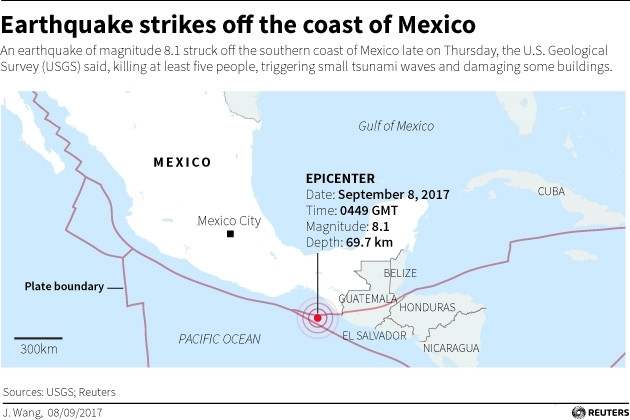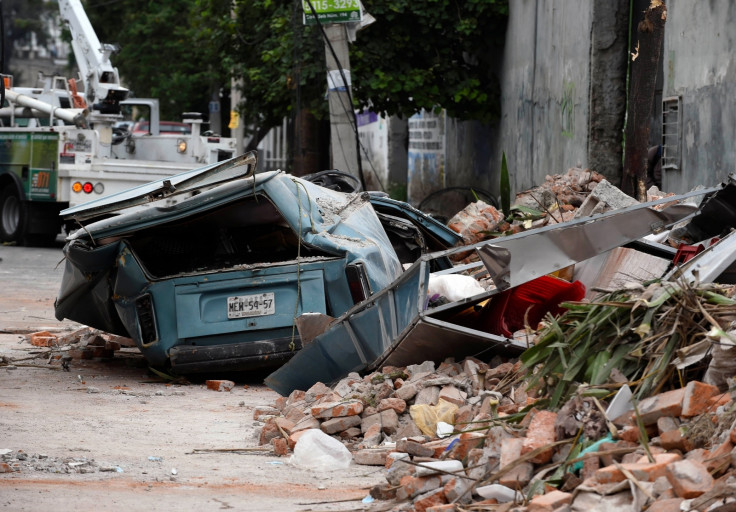Mexico earthquake claims 61 lives as nation picks through rubble
US Geological Survey says earthquake hit off Chiapas state near the Guatemalan border with a magnitude of 8.1
One of the most powerful earthquakes ever to strike Mexico has hit off its southern Pacific coast, killing at least 61 people, toppling houses, government offices and businesses while sending panicked people into the streets more than 650 miles (1,000 kilometers) away.
The U.S. Geological Survey said the earthquake hit off Chiapas state near the Guatemalan border with a magnitude of 8.1 — slightly stronger than the magnitude 8 quake of 1985 that killed thousands and devastated large parts of Mexico City.
Oaxaca state Gov. Alejandro Murat told local news media that at least 23 people had died in his coastal state. Civil defense officials said at least seven died in Chiapas and two others in the Gulf coast state of Tabasco.
Hundreds of buildings collapsed or were damage, power was cut at least briefly to more than 1.8 million people and authorities closed schools Friday in at least 11 states to check them for safety.
"The house moved like chewing gum and the light and internet went out momentarily," said Rodrigo Soberanes, who lives near the Chiapas state city of San Cristobal de las Casas.
The U.S. Geological Survey recorded at least 20 aftershocks of magnitude 4.0 or greater within about five hours after the main shake, and the president warned that a major aftershock as large as magnitude 7.2 could occur.
The USGS said the quake struck at 11:49 p.m. Thursday (12:49 a.m. EDT ; 0449 GMT Friday) and its epicenter was 102 miles (165 kilometers) west of Tapachula in Chiapas. It had a depth of 43.3 miles (69.7 kilometers).
The quake caused buildings to sway violently in Mexico's capital more than 650 miles (1,000 kilometers) away. As beds banged against walls, people still wearing pajamas fled into the streets, gathering in frightened groups.

Chiapas Gov. Manuel Velasco said that three people were killed in San Cristobal, including two women who died when a house and a wall collapsed. He called on people living near the coast to leave their houses as a protective measure.
"There is damage to hospitals that have lost energy," he said. "Homes, schools and hospitals have been damaged."
Tabasco Gov. Arturo Nunez said one child died in his state when a wall collapsed, and the other was an infant who died in a children's hospital that lost electricity, cutting off its ventilator.
The Pacific Tsunami Warning Center said waves of one meter (3.3 feet) above the tide level were measured off Salina Cruz, Mexico. Smaller tsunami waves were observed on the coast or measured by ocean gauges in several other places. The center's forecast said Ecuador, El Salvador and Guatemala could see waves of a meter or less. No threat was posed to Hawaii and the western and South Pacific.
Mexican authorities said they were evacuating some residents of coastal Tonala and Puerto Madero because of the warning.
The quake hit as Mexican emergency agencies were bracing for another crisis on the other side of the country. The U.S. National Hurricane Center said Hurricane Katia was likely to strike the Gulf coast in the state of Veracruz early Saturday as a Category 2 storm that could bring life-threatening floods.

In neighboring Guatemala, President Jimmy Morales spoke on national television to call for calm while emergency crews checked for damage.
"We have reports of some damage and the death of one person, even though we still don't have details," Morales said. He said the unconfirmed death occurred in San Marcos state near the border with Mexico.
The quake occurred in a very seismically active region near the point of collision between three tectonic plates, the Cocos, the Caribbean and the North American.
Mexico's National Seismological Service said the area has seen at least six other quakes of magnitude 7.0 or greater since 1900 — though three of those all occurred within a nerve-wracking nine-month span in 1902-1903.
The new quake matched the force of a magnitude 8.1 quake that hit the country on June 3, 1932, roughly 300 miles (500 kilometers) west of Mexico City.
A study by Mexico's National Seismological Service said that quake is believed to have killed about 400 people, causing severe damage around the port of Manzanillo. A powerful aftershock that hit 19 days later caused a tsunami that devastated 15 miles 25 kilometers of coastline, killing 75 people.
© Copyright IBTimes 2025. All rights reserved.





















